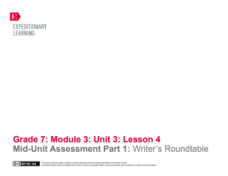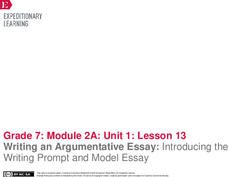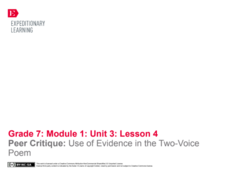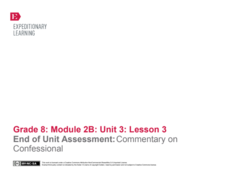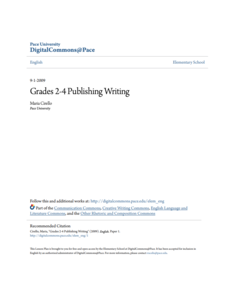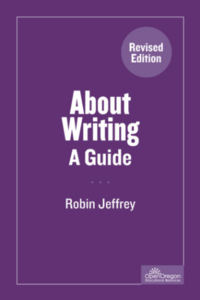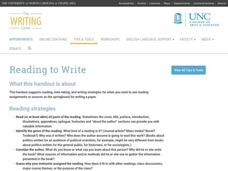Teaching Tolerance
Picture Books
Aspiring artists and budding writers combine their skills in an interactive lesson. Young scholars become authors when they create their own picture books focused on social justice. The resource guides learners through the writing and...
EngageNY
Writing the Children’s Book: Day One
With a brief mini-activity, scholars learn about using strong verbs, sensory details, and precise descriptions. Next, pupils continue working on their children's book storyboards before choosing their strongest pages for peer...
EngageNY
Mid-Unit Assessment Part 1: Writer’s Roundtable
Hear ye, hear ye, it's time for a writer's roundtable! Scholars clarify their thinking about their narrative writing project by engaging in a fishbowl discussion about their plans. As members within the inner circle discuss the topic,...
EngageNY
End of Unit 1, Assessment, Part 2: Revise Essay Drafts
As a culminating unit activity, pupils revise their argumentative essays based on the novel Lyddie by Katherine Paterson. Paying careful attention to grammar, punctuation, and vocabulary, they incorporate teacher feedback to revise and...
EngageNY
Writing an Argumentative Essay: Planning the Essay
A self-assessment helps scholars take ownership of their learning. Using the resource, pupils begin a Writing Improvement Tracker to develop awareness of their writing strengths and challenges. Next, they complete worksheets to plan...
EngageNY
Writing an Argumentative Essay: Introducing the Writing Prompt and Model Essay
Pupils begin the writing process in preparation for an end-of-unit essay based on Katherine Paterson's Lyddie. To get started, they read and discuss a model essay and learn about the similarities and differences between argumentative and...
EngageNY
Peer Critique: Use of Evidence in the Two-Voice Poem
Peer editors review critique expectations before offering feedback on each other's two-voice poems. They record their feedback on peer critique recording forms, and then begin revising their poems.
EngageNY
End of Unit Assessment: Commentary on Confessional
What does commentary have to do with narrative? Before scholars explain the narrative choices in their Character Confessionals, they review provided commentary to explain the score they received on previous assessments. They review...
EngageNY
End of Unit 2 Assessment, Part 2: Revise Essay Drafts
Positive feedback is a great way to improve writers' skills. Scholars receive their draft essays back with teacher comments and start the revision process. Next, they prepare to begin their final drafts at home.
New York City Department of Education
Grade 11 Literacy in Social Studies: Research Paper
The lesson guides young academics through the steps in producing a 10-page research paper on any topic in American history. Historians begin by formulating a thesis and gathering resources, then move on to creating an outline, and end...
Pace University
Publishing Writing
Scholars become familiar with tagline literature with the help of the story, Alexander and the Horrible, No Good, Very Bad, Terrible Day by Judith Viort. After a read-aloud and whole-class discussion, leveled groups complete...
Poetry4kids
Five Ways to Overcome Writer’s Block
Every writer knows how terrible writer's block can feel. Use these five writer's block-busting techniques to help young writers get out of their rut and into a better state of mind.
College Board
AP® English Language Special Focus: Using Sources
What is the most effective way to teach scholars how to write a research paper? Educators explore the topic with the AP® English Language and Composition exam resource. The reference material guides teachers in best practices for...
Scholastic
Lesson 3: Essay Organizer
A three-minute exercise warms-up scholars' writing abilities in order to follow a writing process that ends in an essay. The essay's topic is a barrier and the values used to break it. Four steps include choosing a topic,...
Massachusetts Institute of Technology
Sentence Structure of Technical Writing
Most teachers and scholars look for a way to simplify information. Informational how-to slides simplify the process of technical writing into a step-by-step process. Learners gather information on what to do, as well as what to avoid....
Washburn University
Writing That Works
Looking for guides to help make teaching writing easier? Then this book is worth reading! Writing That Works is a complete guide for teaching technical writing. The guide begins with the what and why of technical writing and ends...
Open Oregon Educational Resources
Technical Writing
Hate having to look in multiple sources to find information?Technical Writing contains all information in one book! The book covers everything from defining technical writing, giving examples of technical writing, and tips for creating...
Open Oregon Education
The Word on College Reading and Writing
Many people struggle putting their words into writing. However, writing does not have to be difficult. The Word on College Reading and Writing offers all areas of support for writers and readers. The text takes literature lovers all the...
Open Oregon Educational Resources
Oregon Writes Open Writing Text
Are some resource books more confusing than helpful? The creator of Oregon Writes Open Writing Text thinks so. That is why the text remains a living document with input from teachers, librarians, and scholars. The eBook begins with...
Open Oregon Educational Resources
About Writing: A Guide
Ever wish writing was as easy as 1,2,3? About Writing: A Guide outlines the steps to successful writing. The guide begins by explaining the types of writing and then takes readers through the process. The guide even includes a section...
University of North Carolina
Literature (Fiction)
An informative installment of the Writing for Specific Fields series helps readers learn how to interpret and write about fiction. The website details nine easy steps for writing a literary analysis—a useful method for all readers!
University of North Carolina
Music
Music is a universal pleasure, but writing about it can be a little trickier. An informative handout discusses common types of music writing assignments that one might encounter in a college-level course. Individuals read about musical...
University of North Carolina
Understanding Assignments
"What do we have to do again?" Chances are you hear this question all the time. Here's a handout that offers scholars tips on how to understand college writing assignments. Class members learn strategies to help them decode assignments...
University of North Carolina
Reading to Write
Silly journal and essay prompts may be fun to write, but they don't model the kind of writing needed for college papers and standardized tests. The 15th part in a series of 24 covers the concept of reading to write—during and after...




